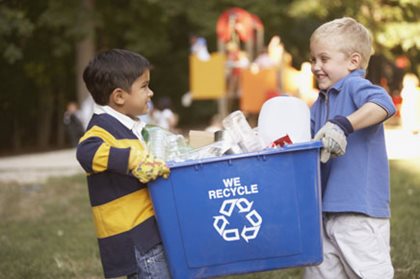What You Need To Know When Organizing an NYC Recycling Program
 With spring in full bloom, now’s a great time to inspire your community to demonstrate support for environmental protection and preservation.
With spring in full bloom, now’s a great time to inspire your community to demonstrate support for environmental protection and preservation.If your NYC condo, co-op, or rental community is considering starting a recycling program – bravo! Just take a look at some of the benefits: conserving energy, saving water, preserving resources, reducing air pollution and saving landfill space. Did you know that in addition to helping the environment, recycling can also provide economic benefits as well? For example, it can reduce the costs of solid waste collection, transportation, and disposal.
If you’d like to give it a go and don’t know how to begin, here are some effective tips on program development and suggestions for existing, New York City-funded recycling programs available at no cost to your property. If you are working with a good property management team, they can assist the board and interested residents directly by guiding you through the process and ensuring compliance with local legislation and restrictions. Read on to get started.
-
Assemble a committee.
The first step to developing any successful program is to create a committee of dedicated volunteers to research and oversee all necessary components. This can include deciding on the categories of materials that are recyclable, selecting and distributing collection bins, interviewing and selecting recycling vendors, and other applicable duties.
Good places to start include contacting your city recycling coordinator, talking to local waste haulers, conducting online research under such keywords as “recycling,” “scrap metal,” “newspaper recycling” and other relevant terms or, simply communicate your desire for these initiatives to your board and your managing agent.
Your property management team can work with the board and its committees to assist with communication and coordination between vendors, developing schedules and solidifying logistics. In addition, your management company can provide information about any state or local legislation, including restrictions on recycling yard waste or hazardous materials, to ensure compliance. After your committee compiles the relevant information, they can make suggestions and recommendations to the board to proceed.
-
Develop a plan.
Using your committee’s recommendations, along with guidance from your managing agent, your property should create a comprehensive recycling plan. Include such considerations as which materials you wish to recycle, how residents can participate, whether there will there be a central drop-off location for recyclables, or whether they be picked up – and how often.
-
What will you recycle?
What materials should your community recycle? To best serve your residents, it’s recommended that your building staff, committee, and/or managing agent conduct a waste assessment to determine which recyclables your community commonly discards. Common recyclable materials include newspapers, magazines, telephone directories, cardboard, food waste, glass containers, plastic and aluminum cans, textiles, organic matter and even electronics. After you determine the most likely recyclables for your community, your committee can research the potential markets for recyclables in your area, as well as potential haulers. Using this information, you can zero in on the right materials to include in your recycling plan.
-
Who will you contact?
There are various ways you can contribute to the recycling efforts in your local area. Whether your refuse consists of textiles, electronics or organic waste, there may be a city funded program available for your community to participate in, at no cost to you.
Some of the top New York City recycling programs available are:
a. re-fashioNYC - A partnership between the City of New York and Housing Works, re-fashioNYC makes unwanted clothing and textile donation easy for residents through convenient in-building drop off and pick up services, at no cost to the building. Click here for more info.
b. NYC Compost Project - The NYC Compost Project can offer your building workshops and guides to managing an outdoor compost bin. The project also offers information guides for residents who wish to set up an individual worm composting bin inside their apartments. Click here for more info.
c. e-cycleNYC - Recycling electronic equipment keeps lead, mercury, and other hazardous materials out of the waste stream and the environment. Depending on its size, your building may be eligible for a variety of on-site service options to conveniently and safely recycle unwanted electronics, including room cleanouts, collection bins and building events. Click here for more info.
d. GrowNYC - Your property manager can alert residents of community opportunities such as GrowNYC’s “swaps” which facilitate waste reduction and material reuse. The program provides an opportunity to find new homes for things you no longer need. Residents can bring clean, reusable, portable items such as clothing, housewares, games, books, and toys to designated locations, and take home something new-to-them, for free! Click here for more info.
e. Apartment Building Recycling Initiative - The Apartment Building Recycling Initiative can help your residents and building staff to improve recycling operations in several ways. These include on-site training for buildings and outreach staff visiting your building to see how recycling is set up and offer personalized suggestions on how to improve. Also available free of charge are recycling decals, posters, checklists, and other materials to encourage residents to recycle more. Click here for more info. -
Let residents know.
Once you have your plan in place, it is necessary to communicate it clearly to residents for successful results. Let residents know the benefits of recycling and how they can participate, where to deposit their recyclables (and how often they will be picked up), and which materials are included – and just as important, which are not.
You can communicate your plan through articles or notifications in your community newsletter, email, flyers, notices posted in common areas, and other printed materials. Your community may also have a virtual, building-wide notification system to deliver messages to residents by email and phone.